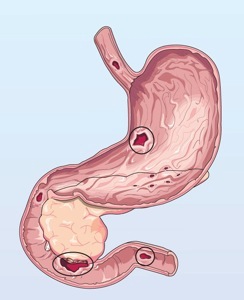Peptic Ulcers
A peptic ulcer is a sore in the stomach or first part of the small bowel.
Signs & Symptoms
-
•A gnawing or burning pain is felt in the abdomen between the breastbone and navel. The pain often occurs between meals and in the early hours of the morning. It may last from a few minutes to a few hours and may be relieved with eating or antacids.
-
•Appetite and weight loss.
-
•Nausea or vomiting dark, red blood or material that looks like coffee grounds.
-
•Bloody, black, or tarry stools.
-
•Paleness and weakness if anemia is present.













